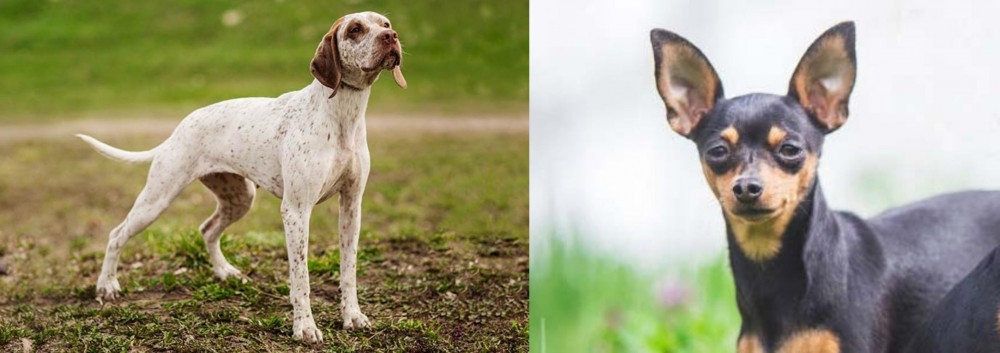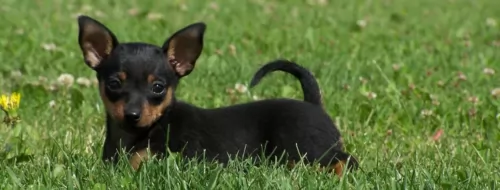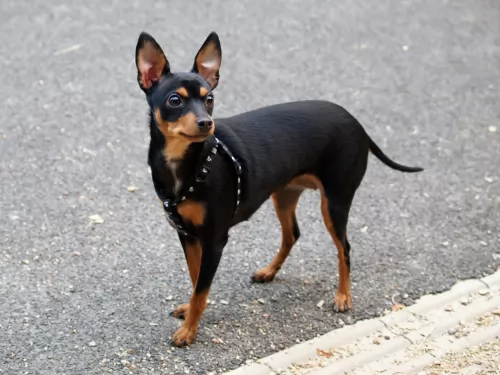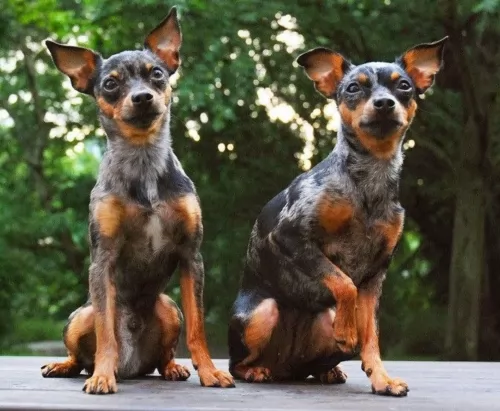 Petzlover
Petzlover Braque du Bourbonnais is originated from France but Prazsky Krysarik is originated from Czech Republic. Braque du Bourbonnais may grow 34 cm / 14 inches higher than Prazsky Krysarik. Braque du Bourbonnais may weigh 21 kg / 47 pounds more than Prazsky Krysarik. Both Braque du Bourbonnais and Prazsky Krysarik has almost same life span. Braque du Bourbonnais may have more litter size than Prazsky Krysarik. Both Braque du Bourbonnais and Prazsky Krysarik requires Low Maintenance.
Braque du Bourbonnais is originated from France but Prazsky Krysarik is originated from Czech Republic. Braque du Bourbonnais may grow 34 cm / 14 inches higher than Prazsky Krysarik. Braque du Bourbonnais may weigh 21 kg / 47 pounds more than Prazsky Krysarik. Both Braque du Bourbonnais and Prazsky Krysarik has almost same life span. Braque du Bourbonnais may have more litter size than Prazsky Krysarik. Both Braque du Bourbonnais and Prazsky Krysarik requires Low Maintenance.
 The Braque du Bourbonnais is an ancient breed, seen in the 15th century in France in the province of Bourbonnais. He became extremely popular with hunters by the 1800’s as a good pointer. He has become very popular in the United States and all of North America. There are often more puppies born in the U.S. than in France. The British call this breed the Bourbonnais Pointing Dog.
The Braque du Bourbonnais is an ancient breed, seen in the 15th century in France in the province of Bourbonnais. He became extremely popular with hunters by the 1800’s as a good pointer. He has become very popular in the United States and all of North America. There are often more puppies born in the U.S. than in France. The British call this breed the Bourbonnais Pointing Dog.
As with so many European hunting and working dogs, the Braque du Bourbonnais almost disappeared following World War I but was saved by the first breed club, established in 1925. Then following World War II, they were again in danger as the club dissolved and birth rates among the breed decreased drastically.
Actually, there were no dogs at all in the French registry between 1963 and 1973. This was attributed to the fact that the registry put more emphasis on the secondary characteristics such as color, length of tail) instead of the hunting characteristics. Because of this some hunter-breeders vowed to bring the real Braque du Bourbonnais back.
Michel Comte took on this task in 1970 but could not find any dogs with pure Bourbonnais blood. So, he took missed breed with characteristics like the Bourbonnais and inbred several litters until he had a dog he was satisfied with. He registered this dog with the LOF in 1973-75. Seeing this several other breeders got into the act and they successfully brought the breed back.
Michel became president of the new Club du Braque du Bourbonnais in 1981 and remained so until 2001. During this time the breed excelled at field trials and was first sent to the U.S. in 1988. The breed is now thriving in both Europe and North America.
 You won’t find this dog outside the Czech Republic, which is a pity, because as one of the smallest breeds, it’s a great choice for people with small properties.
You won’t find this dog outside the Czech Republic, which is a pity, because as one of the smallest breeds, it’s a great choice for people with small properties.
It’s not a new breed, and there are records of it having been around in the Middle Ages, being valuable for catching rats.
The breed went through a decline in the 1980s, but their breeding program was started, although it isn’t an FCI acknowledged breed.
 This is an elegant breed with a medium sized, muscular bod and a round head. The nose will be the color of the coat and the muzzle is cone shaped with a wide base. He has large dark or hazel eyes, again depending on the color of the coat. The ears can drop below the throat and the neck is very muscular. He has a deep, wide chest and straight, muscular legs. The coat can come in two colors – liver and fawn – and ticked or spotted. They have a typical short pointer type tail.
This is an elegant breed with a medium sized, muscular bod and a round head. The nose will be the color of the coat and the muzzle is cone shaped with a wide base. He has large dark or hazel eyes, again depending on the color of the coat. The ears can drop below the throat and the neck is very muscular. He has a deep, wide chest and straight, muscular legs. The coat can come in two colors – liver and fawn – and ticked or spotted. They have a typical short pointer type tail.
 The Pražský Krysařík is a small dog standing at between 20 and 23cm in height and weighing between 1.5 and 4kg.
The Pražský Krysařík is a small dog standing at between 20 and 23cm in height and weighing between 1.5 and 4kg.
The Prazsky Krysarik may be small, but he is robust with a broad chest and a lean body with a fragile, lizard like head, much like a Chihuahua. The legs are fragile and thin. The ears are fairly large and erect and he has a long tail. The coat is short, thin and glossy and is mostly black and tan.
The Prazsky is known for its playful, lively nature, and they’re spunky and intelligent dogs too and will be more than capable of being trained and socialized.
Even though he is such a tiny dog, it will be to his benefit to have him trained and socialized.It makes the dog well balanced and they become well behaved so you can take them anywhere.
They are such friendly, social little dogs too and they love being around their human family. They certainly don’t like being left in the backyard, cut off from their human companions.
They're small enough to be indoors a lot, being able to easily slot into life in the city or in the countryside. They get on well with children and other pets but kids will have to be taught how to treat him with kindness and respect, as those tiny little legs could snap.
 A Prazsky is a dog just like any other – he just wants to be a member of the family. He badly wants the love and attention of his human family but he wants to give love and attention in return too.
A Prazsky is a dog just like any other – he just wants to be a member of the family. He badly wants the love and attention of his human family but he wants to give love and attention in return too.
They make wonderful pets and he is more than willing to put aside playing outdoors to come inside and just be by your side.
These little dogs are a great choice for those looking for a small-sized dog. They’re such friendly, responsive little dogs and they don’t come with many health-related issues. The Prague Ratter adapts well to city or country living and he is prepared to be loyal and loving wherever you take him.
 The Prazsky is a robust dog but there are some diseases that can affect a dog, and skin symptoms such as itchiness or an unusual lump will need to be seen to.
The Prazsky is a robust dog but there are some diseases that can affect a dog, and skin symptoms such as itchiness or an unusual lump will need to be seen to.
Other problems such as excessive drooling, cloudy eyes with discharge, distended abdomen and discolored gums are all reasons to seek the help of your vet. Small dogs like this tend to be prone to dental disease, so keep an eye on his teeth.
Some people look at buying health insurance because they know too well that veterinary costs can add up quickly, even for a tiny little dog like this.
 This breed is prone to weight gain and obesity. Be careful not to overfeed them. Don’t free feed them but give them 2-3 smaller meals per day.
This breed is prone to weight gain and obesity. Be careful not to overfeed them. Don’t free feed them but give them 2-3 smaller meals per day.
Entropion - both of these are issues with eyelashes turning inward or outward and both can
Pulmonic Stenosis of the heart- minor will have no symptoms but eventually the heart will not be able to function efficiently and could lead to congestive heart failure.
The Braque du Bourbonnais needs at least a minimum amount of exercise daily , especially if he is not used for hunting. A fenced backyard for playtime would be perfect but long walks will work. He likes to learn tricks, play ball or hide and seek. Outside activities could include hiking, swimming, agility, retrieving, rally and obedience trials, along with the usual field trials.
 It doesn’t matter what size dog you have, each one requires high quality dog food, whether commercially manufactured or home-prepared.
It doesn’t matter what size dog you have, each one requires high quality dog food, whether commercially manufactured or home-prepared.
Portion sizes should be appropriate to your dog’s size and activity levels. Dogs thrive on simplicity when it comes to food as this prevents them having digestive problems. Boiled chicken, brown rice or pasta and sweet potatoes, spinach and carrots all chopped up and added to your dog’ dry kibble as a treat every now and again will do wonders for your pet.
Fresh, cool water should always be available to your pet around the clock.
The short, smooth coat of the Pražský Krysařík makes him a truly low maintenance little dog. Just give him a brush twice a week and wipe him down with a damp cloth and he’ll always be gleaming like a new penny.
Have his nails trimmed and always check his teeth during these grooming sessions. Smalls dogs battle with dental disease, and this can cause havoc in the body of your small pet.
Walk your tiny pet at least once a day. It just gives him the chance to sniff around a bit and see the world in a new light. He doesn’t require a lot of physical activity, but they will still need regular exercise to stave off obesity.
Get your Pražský Krysařík spayed or neutered if you’re not intending to allow your pet to have puppies. These little dogs can have between 1 – 3 puppies. There are many pros to this procedure for dogs.
Make sure his vaccinations are up to date to avoid some of the deadly dog diseases you get such as parvo-virus, distemper and rabies.